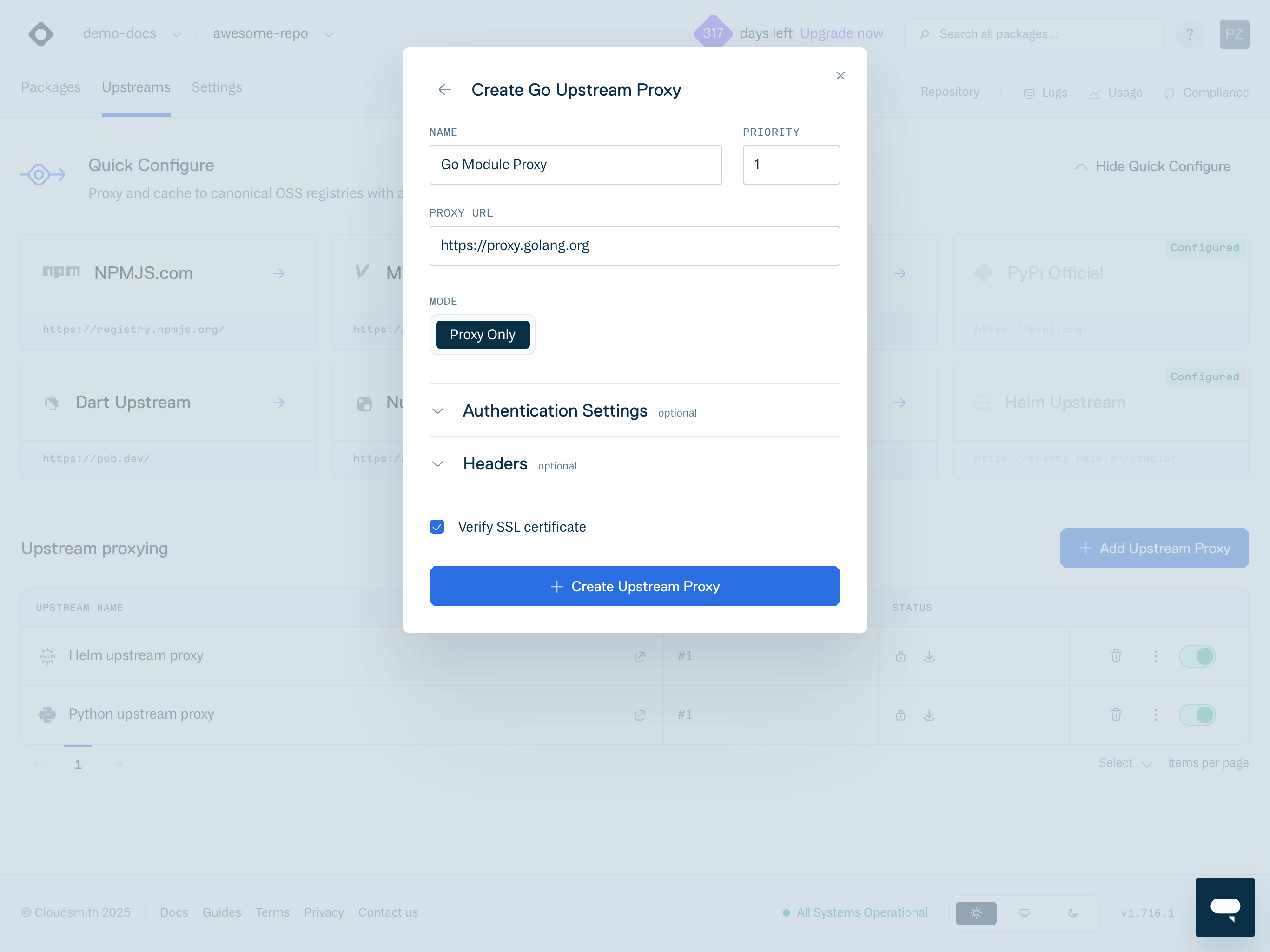Go Registry
Cloudsmith provides public & private registries for Go

Go, also known as Golang, is an open source programming language designed at Google.
For more information on Go, please see:
- Go: The official website for Go language
- Go Packages: Officially supported Go packages
- GoDoc: Documentation/search for Community Go packages
In the following examples:
| Identifier | Description |
|---|---|
| OWNER | Your Cloudsmith account name or organization name (namespace) |
| REPOSITORY | Your Cloudsmith Repository name (also called "slug") |
| TOKEN | Your Cloudsmith Entitlement Token (see Entitlements for more details) |
| USERNAME | Your Cloudsmith username |
| PASSWORD | Your Cloudsmith password |
| API-KEY | Your Cloudsmith API Key |
| PACKAGE_NAME | The name of your package |
| PACKAGE_VERSION | The version number of your package |
Upload a Package
Raw GO binaries
Raw GO binaries are not supported and need to be uploaded as a RAW package format instead
To upload, you need to generate a go module first. You can build a module with standard command-line tooling like zip and git. To illustrate the process we'll use logrus as an example:
- First, we'll create the correct directory structure and check out the version of
logruswe want to pack (v1.4.2):
mkdir -p github.com/sirupsen/[email protected]
git clone [email protected]:sirupsen/logrus.git github.com/sirupsen/[email protected]
cd github.com/sirupsen/[email protected]
git checkout v1.4.2
- Finally, clean up and pack the module. Use
findto include only folders with files in them:
rm -rf .git/
cd ../../../
find -type f | while read f; do zip v1.4.2.zip "$f"; done
Now, we have a go module ready to be uploaded to a Cloudsmith repository.
Building your own Go modules
For a full overview on building your own modules, please refer to Russ Cox's Go Modules.
Upload via the Cloudsmith CLI
For full details of how to install and setup the Cloudsmith CLI, see Command Line Interface.
The command to upload a Go module via the Cloudsmith CLI is:
cloudsmith push go OWNER/REPOSITORY PACKAGE_NAME.zip
Example:
cloudsmith push go org/repo v1.0.0.zip
Older Go projects may not be in the Go Modules format, and you may experience an error when pushing these to Cloudsmith.
You can add module support using
go mod initandgo mod tidy, then commit the newgo.modandgo.sumfiles and add a new tag.
Upload via Cloudsmith Website
Please see Upload a Package for details of how to upload via the Cloudsmith web app.
Example Project
For examples of what your project should look like for packaging and publishing/uploading, please have a look at our examples repository (on GitHub).
Download a Package
Setup
Configure a new Upstream
Early Access
Go upstreams are still in Early Access. Contact us to enable it for your organization.
Cloudsmith supports https://proxy.golang.org as an upstream. This allows you to proxy modules not yet in your repository through Cloudsmith for your Golang projects. Caching support is coming soon.
To enable it for your repository, browse to your repository overview page and click in the Upstreams tab. Then, click on + Add Upstream Proxy and then choose the Go format Upstream.
In the Upstream creation menu, define a name your Upstream and in the Proxy URL field insert https://proxy.golang.org. Click on + Create Upstream Proxy and the upstream shoud become immediately available.

Before you can install modules from your Cloudsmith repository, you'll need to configure your environment for access. The configuration is defined using the GOPROXY environment variable as explained below.
Public Repositories
To define the GOPROXY environment variable for a public Cloudsmith repository:
Cloudsmith Golang endpoint
Endpoints
Cloudsmith provides a dedicated endpoint for Go artifacts: https://golang.cloudsmith.io. This endpoint supports native Golang Upstreams so you can access modules from https://proxy.golang.org.
While the legacy endpoint (https://dl.cloudsmith.io) is still maintained, we recommend to use the new one.
GOPROXY multiple servers
GOPROXYallows the concatenation of multiple servers separated by commas. For example, forGOPROXY=https://dl.cloudsmith.io/public/OWNER/REPOSITORY/go/,https://proxy.golang.org,direct, all requests not satisfied by the first server will fallback the the next one (https://proxy.golang.org).
Linux / Mac
export GOPROXY=https://golang.cloudsmith.io/OWNER/REPOSITORY/
Windows (cmd)
set GOPROXY=https://golang.cloudsmith.io/OWNER/REPOSITORY/
Windows (Powershell)
$env:GOPROXY=https://golang.cloudsmith.io/OWNER/REPOSITORY/
Private Repositories
Private Cloudsmith repositories require authentication. GOPROXY protocol only supports authentication via HTTP Basic Authentication: <USERNAME>/<PASSWORD>.
It you want to authenticate via Entitlement Token, use the literal string token in the user field: token:<TOKEN>.
Secrets management
Entitlement Tokens, User Credentials, and API-Keys should be treated as secrets. You should ensure that you do not commit them in configurations files along with source code, or expose them in any logs.
To define the GOPROXY environment variable for a private Cloudsmith repository:
Linux / Mac
export GOPROXY=https://token:[email protected]/OWNER/REPOSITORY/
export GOPROXY=https://USERNAME:[email protected]/OWNER/REPOSITORY/
Windows (cmd)
set GOPROXY=https://token:[email protected]/OWNER/REPOSITORY/
set GOPROXY=https://USERNAME:[email protected]/OWNER/REPOSITORY/
Windows (Powershell)
$env:GOPROXY=https://token:[email protected]/OWNER/REPOSITORY/
$env:GOPROXY=https://USERNAME:[email protected]/OWNER/REPOSITORY/
About GONOSUMDB and checksum verification
The Go sumdb cannot record the hash value of a private repository and this will cause the local Go command to fail the verification after downloading. You can see more details running the
go mod downloadwith the-xoption.It is recommended to use the environment variable
GONOSUMDBand set its value tocloudsmith.io.
This will skip verification for modules in your Cloudsmith repositories with a module name beginning withcloudsmith.io. Verification is performed against the global checksum database sum.golang.org (this service provides an auditable checksum database service used by the go command to authenticate modules).
GONOSUMDBshould be a list of module path prefixes, like for example:GONOSUMDB=demo-docs/awesome-repo,cloudsmith-test/acme2.While verifying the checksum of downloaded go modules is a critical step,
there's general agreement against having separate checksum databases (for example, having a Cloudsmith checksum database).
See for example: https://github.com/golang/go/issues/44936 and https://github.com/gomods/athens/issues/1572.
Installing a Package
You can install the latest version of a package with:
go get PACKAGE_NAME
Or install a specific version of a package with:
go get PACKAGE_NAME@PACKAGE_VERSION
Security Scanning
Cloudsmith supports security scanning for Go modules.
Please see our Security Scanning documentation for further information about this capability.
Troubleshooting
Please see the Troubleshooting page for further help and information.
Updated 7 days ago

